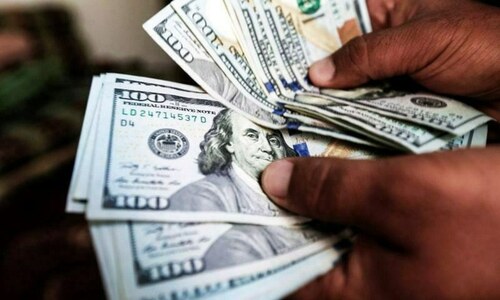The rupee lost Rs1.1 against the dollar in interbank trade on Friday with the greenback closing at 210.95.
According to the State Bank of Pakistan (SBP), the rupee depreciated 0.55 per cent compared to yesterday's close of Rs209.8.
Mettis Global Director Saad Bin Naseer noted that the rupee had appreciated slightly when the market opened on Friday but came under pressure because of an increase in the dollar's demand after banks started clearing pending payments.
The pressure has continued since then, he said, and cited depleting reserves and "insignificant" remittances and export payments.
While there is some confidence because of the IMF deal, the situation would not improve until the country's reserves were stable, he added.
Naseer pointed out that the dollar was on an upward trend in the global market as well.
Meanwhile, Exchange Companies Association of Pakistan General Secretary Zafar Paracha termed the dollar's rise as "unexpected".
"We (currency dealers) do not understand the reason for the [rupee's] decline because we were expecting it to rise by Rs2-3 since the IMF staff agreement has been done."
However, Paracha attributed the rupee's fall to "speculation by banks" and investors being "disheartened" by the instability in the interbank market.
"There should be stability. The government does not seem to be concerned. No one is there to intervene," he said.
He opined that the banks' roles were "very negative" because they "decreased the rate when exporters came to sell dollars and hiked them when importers came to buy".
The rupee had made modest gains against the dollar in the interbank on Thursday after the government and the International Monetary Fund (IMF) reached a staff-level agreement.
After reaching a peak of Rs211.93 on June 22, the dollar started declining for a brief period and fell to a low of Rs204.56 on July 4.
However, the strength gained by the rupee after $2.3 billion Chinese inflows evaporated within a couple of weeks, as the dollar snapped the rupee’s rising streak and gained Rs2.38 in the interbank market on July 5, the first appreciation in the new fiscal year. Since then, the greenback has continued to rise with a slight reversal of the trend on Thursday.















































